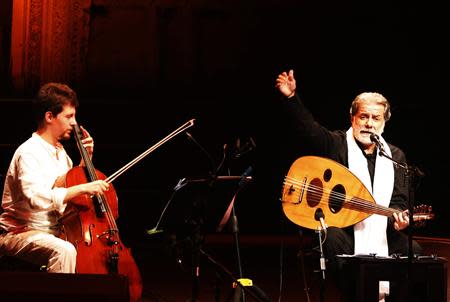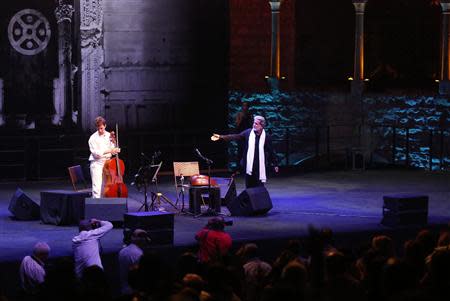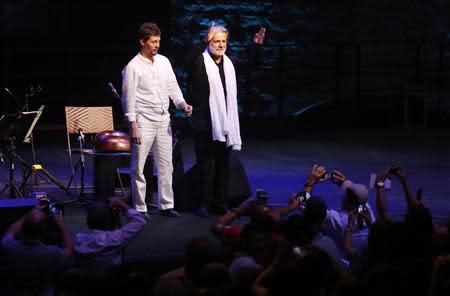Summer festivals highlight Lebanese resilience in shadow of war
By Stephen Kalin BEIRUT (Reuters) - Hours after bombs ripped through the Lebanese city of Tripoli this month, concertgoers gathered for the opening performance of the Baalbek music festival. But it wasn't in Baalbek, and the planned star didn't come. Instead, Brazilian jazz vocalist Eliane Elias serenaded the crowd of 1,000 in an open-air theatre on the northern outskirts of the capital Beirut, far from the internationally renowned music festival's historic venue among Roman ruins in the Bekaa Valley. It was neither the planned location for the festival nor its scheduled opening act. Rocket attacks, kidnappings and threats of further violence in the Bekaa area had forced relocation to a refurbished 19th century silk factory in the Beirut suburbs, and prompted star U.S. soprano Renee Fleming to cancel her trip. But the Baalbek festival and scores of others across the country have insisted on maintaining their programs this summer despite the Syrian civil war next door and growing violence in Lebanon itself. "As long as we're here ... and doing the concert, there's hope. Life still goes on," said Marcel Khalife, the Lebanese musician renowned for his mastery of the lute-like oud. "When culture ceases to exist, the nation ceases to exist." At least 42 people were killed in the August 23 bombings outside Sunni mosques in Tripoli. A week earlier, 24 had died in a bombing in Shi'ite Hezbollah's stronghold in a southern suburb of Beirut. Khalife began his performance on the second night of the Baalbek festival with a moment of silence for the victims. The war in Syria, in which more than 100,000 people have been killed, has reignited old sectarian tensions in Lebanon. Hezbollah has sent men to fight alongside President Bashar al-Assad's forces, while Sunni Lebanese have joined the rebels fighting to overthrow him. "NO TO WAR" "War has no meaning. We have lived war. Nobody knows that better than us," Khalife said in an interview with Reuters. "Through the voice and the oud, we're saying no," he said. "We're saying that love and beauty exist. We're saying no to war. Enough war." The Baalbek festival, founded in 1956 by then-President Camille Chamoun, was halted during Lebanon's 15-year civil war. It was also suspended during a war between Hezbollah and Israel in 2006, when the modern part of Baalbek was heavily bombed. Baalbek, 70 km (40 miles) east of Beirut and 10 km from the border with Syria, is a Hezbollah stronghold. This year, the relocated festival had a reduced program of three performances from the scheduled six, while attendance dropped from about 20,000 to just a few thousand. Nayla de Freij, chairwoman of the Baalbek International Festival Committee, said it was "essential" the festival go on this year. "Baalbek festival is a symbol of culture, of life for Lebanon," she said. The audience at Khalife's concert echoed that sentiment. "We would have loved to be in Baalbek. It would have sent a stronger message," said Wael Mansour, an employee at the World Bank. "But the good thing about this concert is that we sent a message that Lebanon, even with explosions and everything, we still love to go out and enjoy sophisticated music." ECONOMIC ENGINE The Beiteddine festival, launched in the pine forest of the Chouf Mountains in 1987 amid the Lebanese civil war, has been closed in the past for security reasons. Despite a 20-25 percent drop in attendance this year, the festival avoided any significant delays or postponements. "We were born during the war, so we've made it against the odds," said Nora Jumblatt, founder and president of the festival. "It's a cultural resistance that we're all trying to do." She said much of the festival's roughly $3 million budget was spent locally in the Chouf region, southeast of Beirut, on transport, construction and technical services. Guests and performers also put cash into the local economy. According to caretaker Tourism Minister Fadi Abboud, the small Mediterranean country hosts about 300 international and local festivals each year. "You can go nearly every day to a festival somewhere in Lebanon (during the summer)," Abboud said. "That is part of our heritage, our culture and we are trying to show the world, really, that life is going on." Tourism makes up around 16 percent of the country's GDP. The sector was down by about 6.5 percent for the first half of 2013 compared to 2012, and by 27 percent in July. Reflecting that decline, audiences at this year's festivals are 90 percent Lebanese, Abboud said. (Additional reporting by Oliver Holmes; editing by Andrew Roche)




